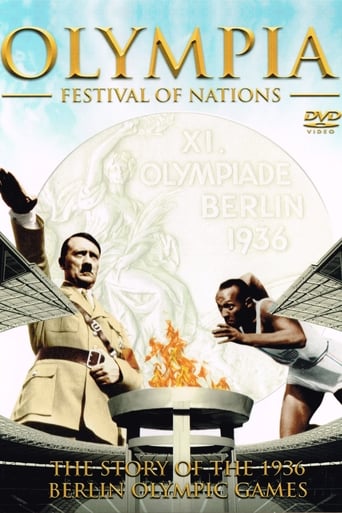


Olympia Part One: Festival of the Nations
The First part of Olympia, a documentary about the 1936 Olympic games in Berlin by German Director Leni Riefenstahl. The film played in theaters in 1938 and again in 1952 after the fall of the Nazi Regime.
-
- Cast:
- David Albritton , Jack Beresford , Henri de Baillet-Latour , Philip Edwards , Donald Finlay , Adolf Hitler , Rudolf Heß


Similar titles

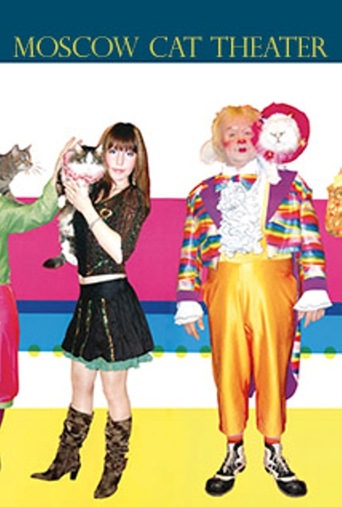
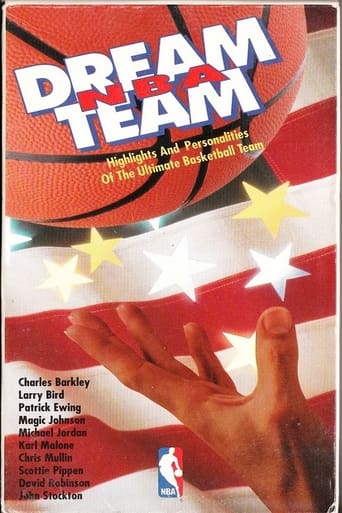
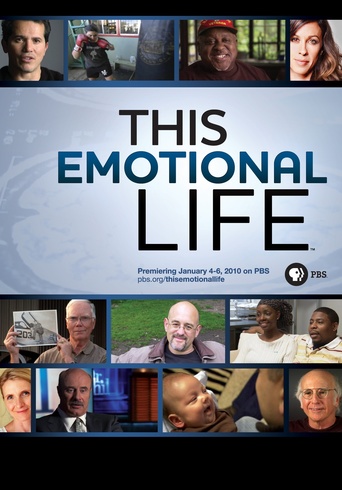



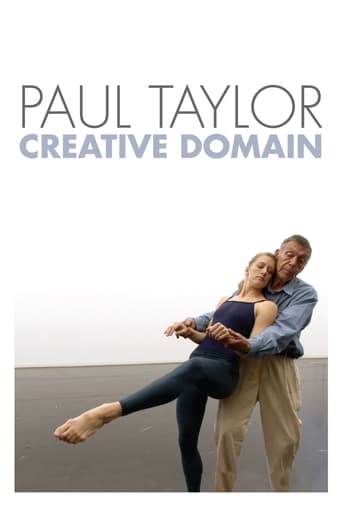
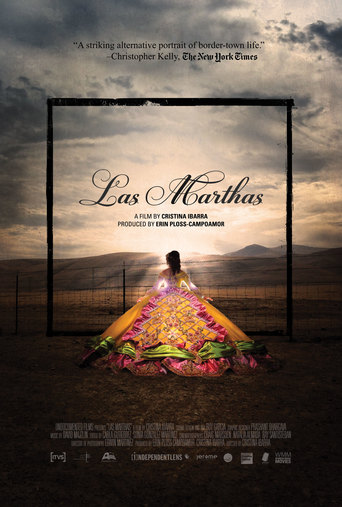
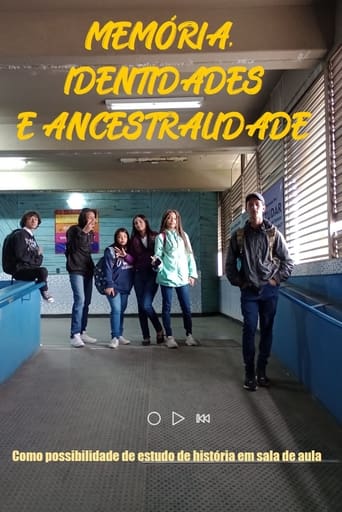
Reviews
Don't listen to the negative reviews
This is one of the few movies I've ever seen where the whole audience broke into spontaneous, loud applause a third of the way in.
It's a feast for the eyes. But what really makes this dramedy work is the acting.
The film's masterful storytelling did its job. The message was clear. No need to overdo.
Whether you think Leni Riefenstahl was a Nazi or not, nobody can deny that she does take a neutral stance in this film. Indeed, it is surprising to hear the American national anthem being played in a German film of the Nazi era. Another gem in the film is to see Leni quietly glorifying the figure of black American athlete Jesse Owens, who famously disappointed Hitler by winning 'too many' medals for his taste. She looks at him as an athlete, and observes his cyborg-like body. When Jesse wins, the people whistle, but that's not important, as the American national anthem will cover them off.There is no doubt, the strength of this film is the cinematography. Riefenstahl did in Germany what Vertov did in Russia, only her style comes closer to today's tele-reportage than the Russian's. There are other fundamental differences between the two.Olympia as a whole (part I and 2) stands proudly. Yet, although the real trick was to film the actual footage as it happened, using pioneer effects of slow motion, fast motion and precise framing, the good stuff is found in the recreations, particularly at the start of part II, which portrays a 'gods-like temple' where the athletes relax in sight of their following tests.It's an admirable work, but as a lot of the old cinema, it is outdated. While 'Triumph of the Will' really wasn't as much (possibly because it's easier to plan an event that takes place in a shorter time, such as the Nuremberg Rally, as a lengthy event like the Olympic games), Olympia is lengthy, and overall, not an easy watch. In some bits, it's hard not to be tempted by the fast forward button on the remote control. But there is no denying that this is another testimony of Leni Riefenstahl's often underrated and mostly willingly obscured influence.
Since the 1936 Olympics was pretty much one big propaganda event for Hitler-Germany, this documentary about it can also be seen as a piece of propaganda. You could say that it's just a recording of the event and it doesn't glorify Hitler and Nazism. It show a bit too much of Hitler and his friends than really necessary and it glorifies the German athletes more with its images than with most other athletes is the case. The 1936 were used as a medium to show the supremacy of the Aryan race and show the German athletes as Übermenschen.Besides being known as the Nazi-propaganda Olympics, the 1936 Olympics are of course also known as the Olympics of Jesse Owens. The black American who won 4 golden medals. A clear booing and whistling can also been heard during the first running that he won and during some of his other wins and attempts, while all other athletes got cheered at, no matter were they were from. This didn't only happened to Jesse Owens though, since he of course wasn't the only black athlete at the Olympics who won a medal.They didn't used only footage from the actual Olympics but some of the images were obviously added later into it. I'm not just talking about the movie its intro but also of the actual sporting events. This can be the drop of a spear or discuss and things like that. It's obvious that it's all added later and that the movie is edited in such a way that it's obvious that at times the crowd reactions and all don't really go with the images but for artistic reason it obviously works out well for the movie. It often gives the movie some diversity and more pace as well.The documentary shows the most important attempts and athletes and of course the wins of all events. It often uses multiple camera-angels for this and some slow-motion as well.There is no denying in it that Leni Riefenstahl was a very talented documentary maker though it of course it remains a shame that she mostly used her talent for making Nazi propaganda pieces, despite always having denied she was a Nazi sympathizer herself. It gives her documentaries a bit of a bitter taste, no matter how technical well made and revolutionary they all are. She gets very much appreciated and recognized as a pioneer in documentary making but she also gets hated at the same time. It doesn't really make her documentaries any less great to watch though. It's always something beautiful, renewing and just unforgettable.8/10http://bobafett1138.blogspot.com/
Instead of Triumph of the Will there's surprisingly little politics and propaganda going on in this first part of Riefenstahl's Olympia. Riefenstahl is documenting the athletics in the Olympic Stadium, and yes, Hitler is there, but that's about it. Sure, the German athletes are the best and heroic, and there's a piece in there when the commentator says something like 'the best white European runners against the black giants', but that's about it.Jesse Owens was the star of this Olympics in many ways, and Riefenstahl isn't reluctant to show his big smiles after winning yet another gold medal. Although a lot can be frowned upon in Germany in those days, 'Olympia' isn't as charged as many people believe it to be.Having said that, this first part of Olympia is basically just showing us who won the medals in the Olympic Stadium, and although some of the images are great and there's a beautiful use of slow-motion, it's not really that interesting...6/10.
Leni Riefenstahl started something that we all take for granted nowadays when we watch sports.From the following camera in the 100 meters to slow motion action to the build up of tension(start with lesser athletes and end with the winning performance).All this is combined with some beautiful shooting of both the athletes as of the crowd together with the impressive Berlin Olympic Stadium.OLYMPIA is not a propaganda movie like Riefenstahl's magnum opus TRIUMPH DES WILLENS but it still shows hitler and his gang plus the swastika flag several times(but hey,why is the waving swastika flag propaganda and the waving stars and stripes in SAVING PRIVATE RYAN just a flag).Anyway,it isn't so much about the nazi's,it's about the Olympics and Riefenstahl gives us a journalistic report of it.Highlight to me(and probably to everybody)is the winning performance of Jesse Owens,one of the greatest athletes of the 20th century.The second part of the documentary is the lesser of the two with too much emphasis on the diving,but it has got a comic sequence with the Militry.A good documentary with high historical interest,but I would rather recommend TRIUMPH DES WILLENS.It is more shocking but it gives a better view of the nazi's. 7/10
